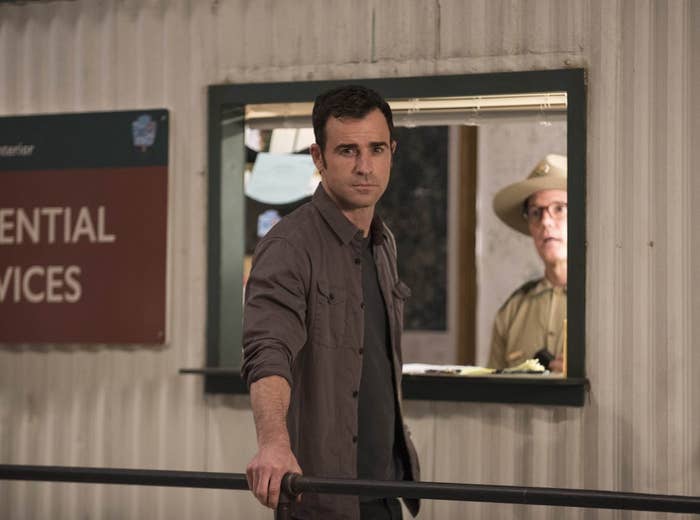
A meditation on grief, anger, survival, loss, and madness — it's safe to say that there's never been anything on television like The Leftovers. Tom Perrotta's 2011 novel of the same name examined the aftermath of the disappearance of 2% of the world's population through characters in a small New York town; Perrotta and Damon Lindelof (Lost) co-created The Leftovers for HBO, and its first season aired last year. For some critics and viewers, the show was just too sad — "grim" and "grimness" were a frequent criticism.
It had its champions, too, of course. And those who stuck with the show through its first 10 episodes were rewarded with an unprecedented emotional experience. Also, yes: even some hope for these characters' futures. Justin Theroux, Carrie Coon, Amy Brenneman, Liv Tyler, Christopher Eccleston, Margaret Qualley, and Chris Zylka led the cast in its first season, and they will all be back in its second, though The Leftovers' center will move from Mapleton, New York, to Miracle, Texas — a town that claims to have lost no one in The Sudden Departure. Miracle, therefore, is a place where Kevin Garvey (Theroux), his daughter, Jill (Qualley), and his girlfriend, Nora Durst (Coon), along with their new adopted baby, will seek safety. And there, the Garvey-Dursts will meet the Murphy family (led by Regina King and Kevin Carroll), who clearly have their own secrets.
BuzzFeed News talked with Lindelof and Theroux, who had to leave to go to a press conference about two-thirds of the way through the conversation, about The Leftovers' new location and characters, why Lindelof almost thought one season was enough, and for Theroux, why working with Lindelof reminds him of working with David Lynch.
Oh, and — why the hell Ann Dowd is back on the show when her character, Patti Levin, the leader of the Guilty Remnant, is dead!
Justin, what was your reaction when Damon told you the show was going to mostly move from Mapleton to Miracle?
Justin Theroux: My first reaction was "Yay!" because we're going to get out of the places we were shooting in Queens. It did start to feel in the first season that it became kind of oppressively small in that town. And it felt like it was kind of shot out in a way. Obviously, at the end of the first season, Kevin had gotten his wish.
Most shows don't blow themselves up in between the first and second seasons. Could there have been a scenario where everybody stayed in Mapleton?
Damon Lindelof: Absolutely. That was the default position. And this was a very unique experience for me, largely because it was an adaptation. And working with Tom and saying, like, All the things that make this a good novel — in my opinion, a beautiful novel — run sort of counterintuitive to making it an ongoing television series. So how do we take that idea: This actually kind of feels like it's over.
Let's start to talk about what life looks like in Mapleton a week or a year or five years later in the way that, you know, most television dramas would continue, whether it's Desperate Housewives or Friday Night Lights or even Lost. And we started to talk about that, and I started feeling just like, You know what? Maybe we're done. Maybe there shouldn't be a second season of The Leftovers. This is just feeling like we're continuing for a continuation's sake.
And most importantly, what do the characters want? Because in the finale of the first season, all of them are sort of articulating this desire to stop feeling shitty. So what are they going to do about it? What if there is this kind of kitschy town that claims that nobody was departed from there? It's a town of like 400 people, and it's not really that amazing. And then we started talking about what it would be like to live in that place.
And then it was like, What if the Garveys moved there? That seems like it's not just a gimmick, like that's a place that they would gravitate towards. They wouldn't say they were moving there because it was magical, but that's exactly why they're moving there. And it started opening up, and I started getting excited creatively.
JT: There's kind of a — not a separate belief system for the people that live there, but there is a kind of disease of uniqueness. They have their own brand of why they were spared, or why they were special, or what Miracle is. So it was cool just from an audience standpoint to watch those people, and a character standpoint to interact with them. Because the Garveys bring their own set of problems with them.
DL: Yeah, I think that the story that the show wants to tell is that The Sudden Departure is a scapegoat. It's this excuse for people to behave the way that they wanted to behave before it happened. So this idea that Episode 9 in the first season was really all about showing that the Garveys were very fucked up prior to The Departure. And I think that the show is very interested in telling that story now again in Miracle — the best place to tell that story is a place where The Departure didn't happen at all. Sort of like, Are families still fucked up? Yes, they are.
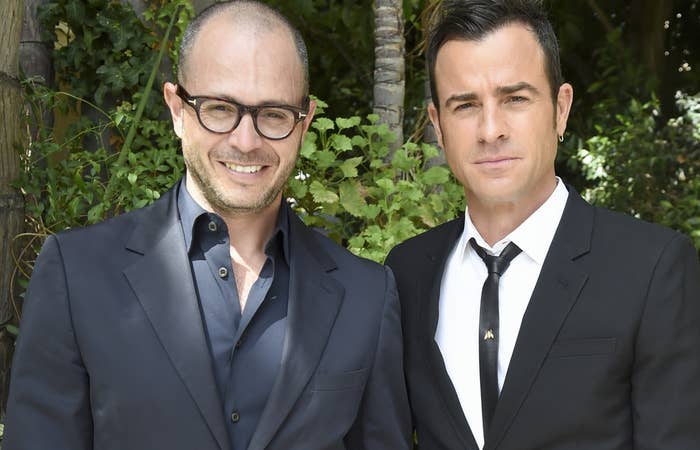
Justin, I know that Damon is aware of — even if he doesn't want to be — what critics and viewers are saying about his work. Do you pay attention to those kinds of things?
JT: I was never a — not on purpose — fan of Lost. I didn't watch the entire series. So I didn't come to our show with any preconceived anything. You know, I only based it on sort of what our conversations were, and what he was pitching as a show, and the themes that we were going to explore. If there's a recurring theme that I'm loving this season, it's this sort of extreme agnosticism, or this exploring of belief systems and things like that. I mean, when I first heard just conceptually what The Leftovers was, I was like, Is it a rapture show? Is it one of those weird, crazy Christian books? And of course, three pages in the script, that's dispelled. But it has kind of taken a back door into some of those issues, you know, which I really love. Because to me, that's where sort of the rubber hits the road emotionally for an audience or myself.
DL: I don't want to make private conversations public, but Justin is very aware of my inability — is it an inability? I'll say that I have a proclivity to focus on and seek out negative feedback as a way of balancing the immense kind of blessed life that I have been leading and sort of the idea that I get to do this, period — or that anybody is watching anything that I've done or that I have achieved any level of success. So I feel like I need to tie the figurative cinder block around my ankle in an effort to kind of find some balance, because if I didn't do that, I would just — I'm very scared of what I would become. And Justin has intervened on multiple occasions and said, "That is very toxic, and I used to do that, and you need to stop it."
JT: Through a different spectrum — whatever is out there about you on your life or work. No one really knows Damon or the way his brain works. They know his work. And when you seek out the bully in the high school or when you chain yourself to this idiot avatar, you're inevitably going to get punished for it.
DL: So the name of my production company shouldn't be "Idiot Avatar"? I just registered that domain name. I thought it was so clever.
JT: Damon puts more bricks on his back than he ever should. But when the show is working really, really well, which it does frequently, it's when he's, I can tell, untethered himself from that stuff, and is really exploring the ideas and themes that he wants to do. It operates in its own tempo, like a great jazz record. So if people are willing to sort of watch, not be looking for hooks and poppy lyrics, they're going to be very excited by the show.
And also, live in mystery, you know? Having worked a little with Lynch, it's a different milieu, but it feels the same in that he goes down the channels that he wants to go down, with dream logic or whatever. And certain things aren't explainable. And some things are. You have to tune your ear to it a little bit.
I think Damon's "idiot avatar" is, like, showrunner/creator guy who is sensitive to criticism about Lost — causing him to quit Twitter, and so on. Just to be clear, Justin, is your idiot avatar the story told about you and your life in the gossip press?
JT: Yeah, two totally different things. But you learn within a week — at least I did — like, Oh my god, if you even open that can, you're just going to feel terrible about yourself all day long. Because there's this sort of anonymous democracy that's happening out there, that's anything but. It's more like a swarming dictatorship sometimes.
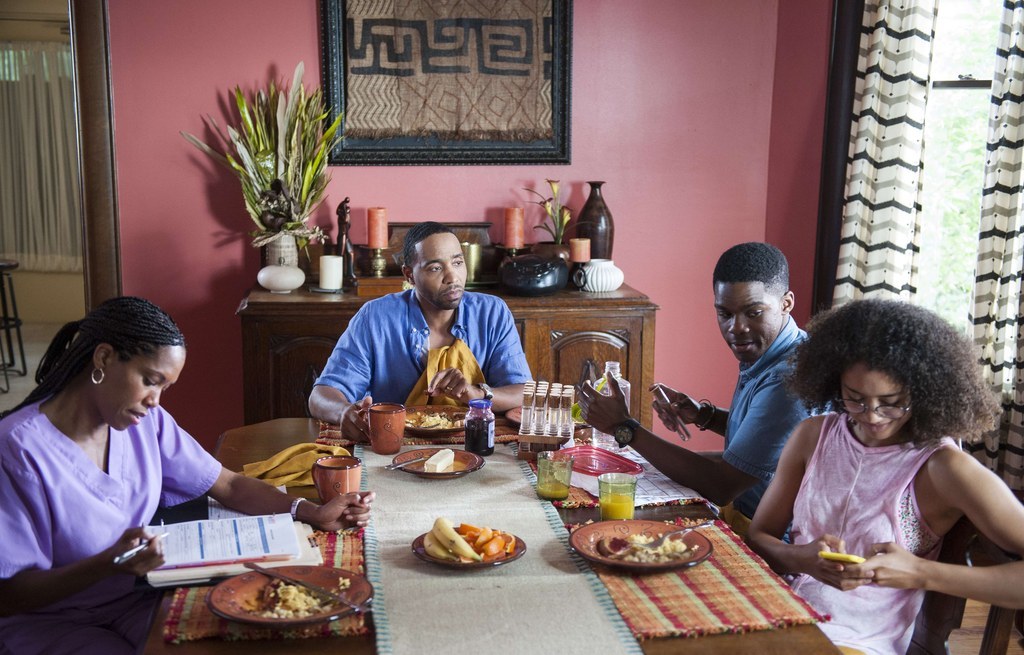
I wanted to ask about the Murphy family, whom we meet in Miracle in the season premiere. I'm curious about the Murphys in general — and race also as a factor this season.
DL: We started talking fairly aggressively about what the second season of the show is going to be around the end of October or November of last year, so it was before Empire premiered. So the one thing that I know is that at the very least, our intention in making the Murphys a black family wasn't based on like, This is where the zeitgeist is flowing now.
The characters — it's not about being black or being white. But there is this sort of certain interesting thing that starts to happen when a white family moves in next door to the black family.
JT: There's something just visually — even in the first episode. It didn't happen until I got on set where I was like, Oh, there's this sort of awkward wave between me and the neighbor. Just the optics of it look sort of like the Montagues and the Capulets. And also, these are people who literally bought their way into the town, you know? So it's a sort of a forced entry into this world.
DL: I wouldn't say that the scripts are colorblind. But at the same time, this is not a story about race. And I think that particularly someone like Shonda Rhimes does that incredibly well, but then she finds — and obviously, she's writing from a different place, because she is a black woman — moments to suddenly say like, But these are black people, just so you know. So we try to find those moments.
There's this great actor, Darius [McCrary], who plays Isaac in the show. And in the premiere, when John Murphy comes to his house and is basically going to burn it down, Darius said, "It's important for me as a black man to relate to him as a black man in this instance. So is it cool with you if I basically say, 'Brother, don't do this?'" And I'm like, "Absolutely, because that's something that I would never write." I want to write this without offending anybody, but sometimes in the avoidance, in my desire to be colorblind, I'm being more colorblind than I would be if I was acknowledging it. I really do look to the actors to make sure I'm not doing anything insane.
And I'll just say one more thing about it, which I don't think I've said because it's a slightly nerve-racking thing to talk about, which is: I think that a lot of white writers want to cast more diverse roles, but they don't because they're afraid they're going to fuck up. And they're afraid they're going to offend somebody, and it's just a minefield. And I did have those feelings, but I was like, But this is what feels right, and this is the story that we're going to tell this year, and we're going to go for it. It's not a show like The Wire that is really about race and class. And Friday Night Lights is another show that did it incredibly well, where the shift to East Dillon, for example, did actually become racial. The idea of, like, this is what Dillon gets, this is what East Dillon gets; this is what the East Dillon football team looks like, this is what the Dillon football team looks like.
Again, we're not telling that story. But I do feel like we're now in a television landscape where it's actually kind of irresponsible to present the world — when you are driving by posters for shows — where there are just exclusively white faces.
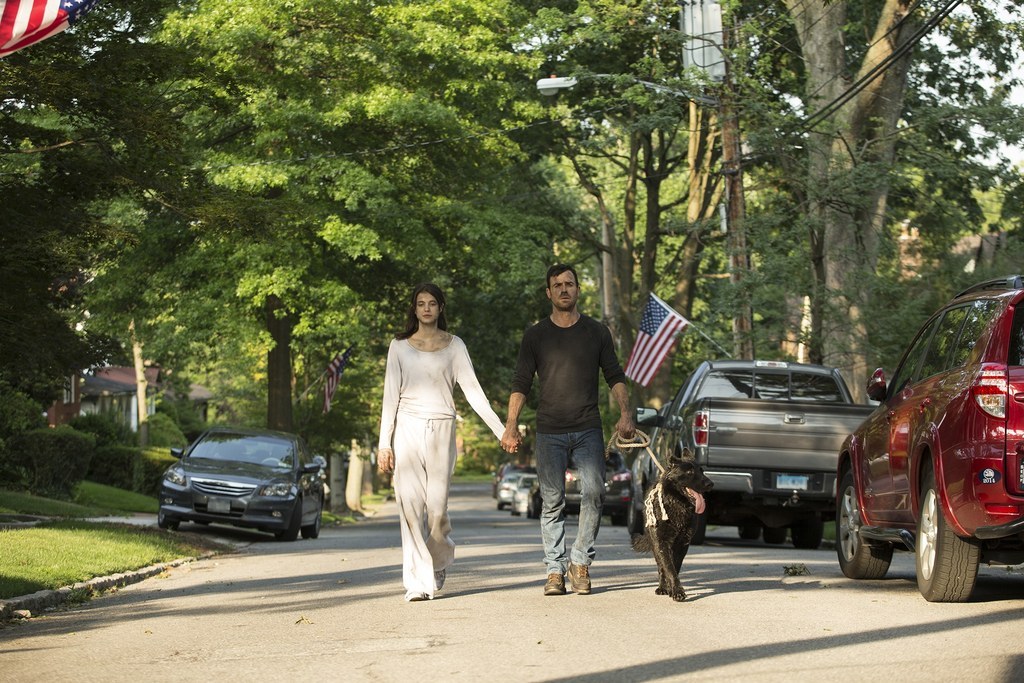
Justin, before you go, I wanted to ask about the Season 1 episode, "The Garveys at Their Best" — the second to last episode, when we see everybody leading up to The Departure. Having gone through the eight episodes before that, what was that like to then go back and play the old Kevin?
JT: What I found most interesting about it was how just kind of cold he was to his family, and indifferent he was to them —watching him essentially be ungrateful for what he has and had. You realize his whole arc — his super arc for the season — was just basically to try and get his family back together, however that looked. It informed the finale probably more than anything else, because you realize, What does he really, really want?
He articulates that in the finale: I was ungrateful. I didn't know what I had. I wanted to leave. It's an incredibly intense role. You're doing a lot of emotional things — and things that probably don't make sense to you at the time.
JT: When you look at roles, they normally can fall into a pattern. And this role, as Damon promised at the beginning, was going to be a very elastic role. And he was going to try me very hard. He's been setting up enormous walls for me to scale just as an actor, and it's really fun to try and do 'em — sometimes successfully, sometimes not. But I'm never having to play, aside from perhaps confusion, I'm never having to play the same beat repeatedly. It's always coming from a slightly more specific emotional place than the last thing. So it's not Kevin constantly getting his bell rung. He's constantly stretching, in a way, for him. Sometimes he's effective, and sometimes he's not.
But this season in particular is just exciting because it's not the grief or the loss or whatever. Obviously, at the beginning, it's tinged with hope, and then being burdened with this completely other thing, which was one of the most beautiful arcs I've read in a long time. And you haven't seen it, but how that relationship plays itself out is just stunning.
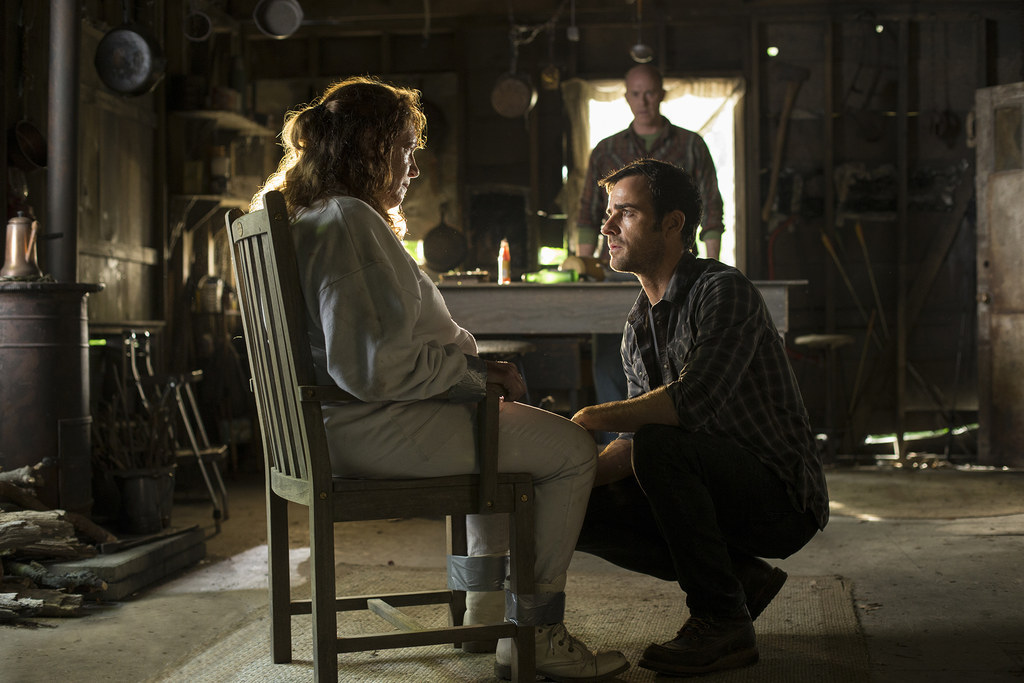
Justin had to go, but Damon, in referring to Kevin being "burdened," he was talking about Ann Dowd being back as the late Patti Levin. Can we talk about Patti without being too spoiler-y? Dowd has been announced as a series regular.
DL: Sure, and they're putting her in the promos.
Here's what I'll say: The premise of The Leftovers is that 2% of the world's population disappears. In an instant, 140 million people are gone, and this is the aftermath. And I restate the obvious because that is a supernatural premise. And so there are other television shows that employ the usage of characters who are not there. You know, how Nate sees his dad on Six Feet Under or how Dexter sees his dad on Dexter, or spoiler alert: Mr. Robot used a device very similarly. And because those worlds are not supernatural — they're very clearly not supernatural — in some cases, it's an artistic device. In other cases, it's mental illness. For us, because there is a supernatural presence in this world, because Kevin's dad heard voices last year but maintained and represented as a sane person, he basically said, "I am actually hearing these voices. These voices are real," this possibility has to be open for us. Kevin would probably rather be crazy than believe that this is actually Patti Levin following him around.
And so we were really curious in exploring what is a traditional exorcism story without any of the tropes of exorcism stories. And what does that look like in the world of The Leftovers? But at the same time, this idea of representing: Is it mental illness? Or is it the manifestation of guilt?
But also going, like, Wow. Episode 8 last year was really good. Justin was amazing, and Ann was amazing. How do we not do more of that? What happens if and when Nora finds out that Kevin can see Patti, if she's looking for safety and stability? What happens? The idea of Patti as the other woman just supercharged the entire season.
Yes — I wondered whether she was a character you couldn't bear to part with.
DL: This isn't to diminish soap operas, but it's sort of like, if you have a very popular character, you bring them back from the dead, or you present their twin. And it's a device that people kind of roll their eyes at, but at the same time, if you kill Jon Snow in the Game of Thrones finale, the audience is basically like, "I can't believe you killed Jon Snow! When's he coming back?"
But you know, again, I think it really just boils down to the simplest of ideas. Do you want to watch a television show where Ann Dowd and Justin Theroux are in scenes together? I certainly want to write that television show.
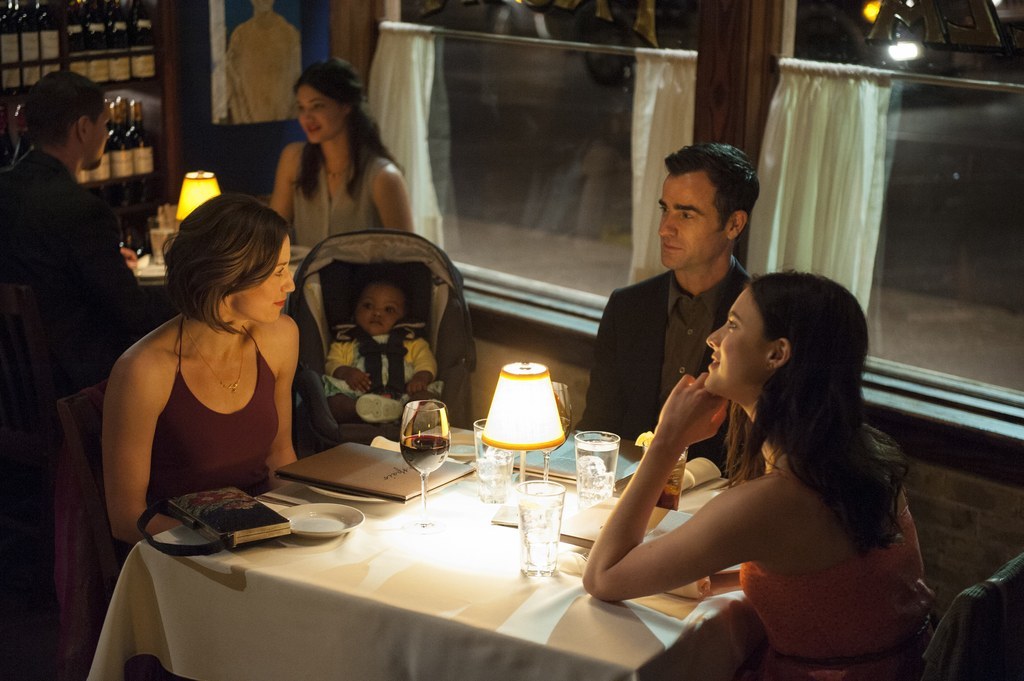
You also mentioned that this is a supernatural world. You've been very clear that there will be no answer to The Sudden Departure — but I'm curious whether there will be answers along the way about some of the other, smaller mysteries you're creating.
DL: That's a really fair question, and I think that as frustrating as it may be, it's also one that I don't want to answer. To answer your question is to basically answer a much more specific question, which is: There is a disappearance in the second season of the show that seems to be a much more specific mystery than the overarching mystery of The Departure. So are we going to answer where those girls went?
And the answer is: We're not if they departed!
I see.
DL: I will say that I learned a lot from Lost, but I can't tell you what I learned. It's just more intuitive, but I'm drawn to stories that have a certain level of ambiguity to them, even though I know that that's the thing that drives a lot of people nuts. I feel like I'm a little bit like cigarettes now, which is like, Well, if you know that I'm addictive and bad for you, then stop smoking me!
Speaking of which: In Season 1, after doing an initial publicity push, you took yourself out of that and stopped talking to press. Here you are, though: How do you feel these days about talking about yourself, your work, and The Leftovers?
DL: I have a lot of mixed feelings about it. I think it is my inclination to represent, in some way, that I'm proud of the work and that I stand by the work. And I fear that if I just am completely and totally reclusive and that I don't engage in that dialogue, that I am hiding. But then it is my plan, once the show actually exists out there in the world, to retreat again because I think that the only questions that will be asked is, "What did you mean by this? What was your intention here? And what's going to happen next?" And those are fair questions that I don't necessarily want to answer.
I think that this is really a make-or-break year for The Leftovers. Just because we got a second season doesn't mean it's a foregone conclusion there will be a third. And for a show that had fairly limited viewership and was divisive among critics and zero major awards nominations, those things all matter. They matter to me. I want to feel like the show matters. And my job is to basically make the best version of The Leftovers that I can. And the idea of constantly engaging in conversations about what's good and what's not good about the show doesn't help me do that.
One thing that happened throughout Lost was how finite it was — and you successfully fought a battle with ABC to give you an end date. Is The Leftovers finite or infinite?
DL: The sheer output of Lost made it a different process. But I will say that I've taken great comfort in the fact that we talk about The Leftovers one season at a time. So every season of The Leftovers should feel like a novel.
And that jams us in some ways, because maybe it feels like the last several episodes are anticlimactic, or they're winding down. But at the same time, the alternative of introducing new story strands or new characters that demand that the audience tune in for another season — I don't want to do it that way. So I would answer your question by saying every season of The Leftovers could be its last. And then when that season ends, we sit down, and we have these conversations about: Where could we go from here? And if something interesting comes up, then we'll pursue it. And if it doesn't, then that's the end. I think that the best version of The Leftovers is finite, and that it does feel like the show has crossed the halfway point, at the very least — if not, the three-quarters point — at some point in the second season. In terms of saying, I don't want to put these characters on a treadmill.
And I know even though it's great that Lost ended, it still ended like 20 episodes after it should have. And that's not me saying there shouldn't have been a Season 3, or there shouldn't have been a Season 5 — there just was too much story to support. And I would much rather err on the side of always leave 'em wanting more.
This interview has been edited and condensed.
